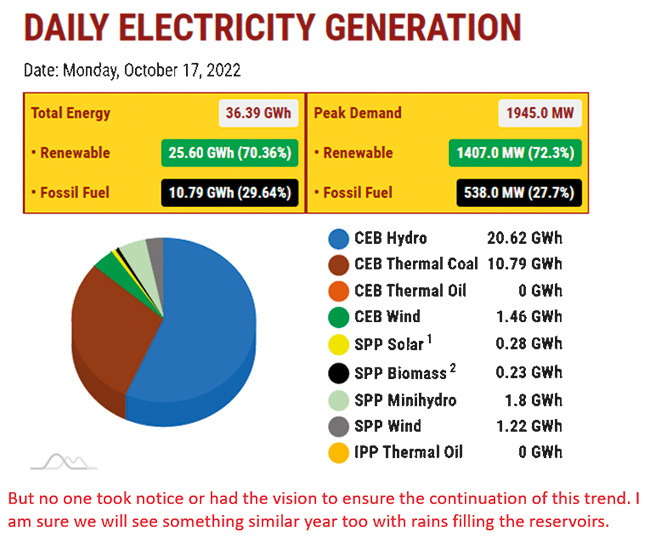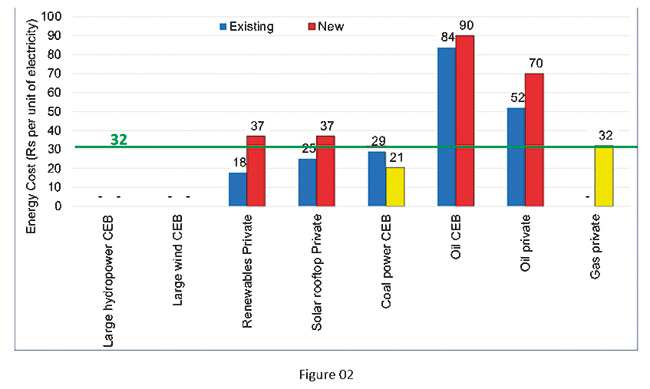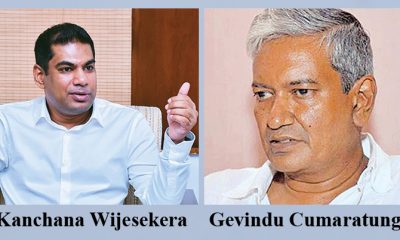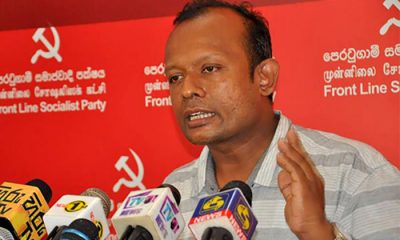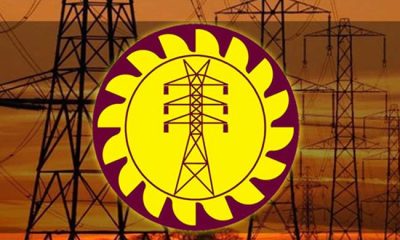Features
Another electricity tariff hike: Is there no option for Sri Lanka?

by Eng Parakrama Jayasinghe
parajayasinghe@gmail.com
Electricity consumers reeling from the massive increase in tariff in February (adjusted somewhat in July 2023) were naturally appalled by the request for a further increase by the Ceylon Electricity Board (CEB). A public consultation was held on 18 October 2023 by the Public Utilities Commission of Sri Lanka (PUCSL) to seek the stakeholders’ views on the CEB’s request for a tariff increase. However, the many representations made both in writing and orally at the public hearing do not seem to have had any impact; the PUCSL has allowed the tariff increase of 18% sought by the CEB. It is however somewhat relieving that permission has been granted conditionally. More on that later.
The rationale for the electricity tariff increases is that the CEB needs to cover costs. While the principle of cost reflective tariff is acceptable it must be read in conjunction with the provision in the PUCSL Act which states, among other things:
PUCSL Powers and Obligations
Excerpts of the Electricity Act No 20 of 2009:
· Clause 3 (1) d – ‘to regulate tariffs and other charges levied by licensees and other electricity undertakings, in order to ensure that the most economical and efficient services possible is provided to consumers.
· Clause 4 (1) a – ‘to protect the interests of consumers in relation to the supply of electricity by promoting efficiency, economy and safety by persons engaged in or in commercial activities connected with the generation, transmission, distribution, supply and use of electricity.
· Clause (1) c – ‘to secure that licensees acting efficiently will be able to finance the carrying on of the activities authorized or required by their licences.
(These clauses have not been revised in the amendments to the Act in 2013 or 2023)
During the aforesaid consultation, many startling revelations emerged. Firstly, the CEB itself admitted that the expected loss incurred was not 30 billion as originally claimed but Rs 18.5 billion. Also, the PUCSL has also contested the daily demand values and the estimation of the hydro resource availability expectations in the coming months. Many industry experts too contested those estimates.
A request for tariff increases without due diligence to ensure the above criterion is not logical by any means.
Past practices
However, we Sri Lankans are left with Hobson’s choice when the CEB requests a tariff hike after running up massive losses. It can do as it pleases after incurring losses and expects the Treasury to bridge its deficits. Unfortunately for us citizens, the Treasury has been doing just that and the net effect is that consumers indirectly bear such burden without any recourse for redress.
Records indicate that in the past decade alone the CEB has thus caused losses amounting to Rs 1 trillion and still remains afloat thanks to funds provided by the Treasury or state banks.
It is of some comfort that the Treasury has apparently decided to discontinue this practice.
Present situation
When the February tariff hike was imposed, it was claimed that with that the CEB would be at least cost neutral and would not need further subsidies. Either it was false promise or the CEB had no intention of honouring it.
Now, the CEB has obtained a further tariff hike to cover losses already made. What would happen if it couldn’t secure a tariff increase? Could the Treasury make funds available, as it did in the past? If it does, there would be further increase in taxes and tariffs. Head we lose tails they win!
Reasons for the CEB’s failure to be become cost neutral as promised are as follows:
• Indiscriminate use of oil-based power generation
• Completely ignoring the principle of adopting least cost mode of generation
• Inability of meet the fund requirement to purchase coal
• Irrational and politically motivated steps to provide power 24/7 irrespective of cost and no one being accountable for such costs
• Ignoring the fact that Sri Lanka is still bankrupt
• No effort to facilitate and accelerate the development of much more economical Renewable Energy
The need for the previous hike was the large increase in cost of both oil/coal-based generation. That should have been recognised by both the CEB and the Ministry and appropriate action taken.
But what did they do? They did away with the 2.5 hr power cut to which the consumers had got accustomed; it would have helped reduce the use of expensive generation options. The government made a political decision, knowing very well that the additional generation had to be oil/coal based at much higher costs.
• The CEB was not keen to reach cost effectiveness or seek more logical and economical modes of power generation.
• All past losses were taken up by the Treasury – eventually passed on to the consumers indirectly. One trillion rupees has thus been ‘stolen’ from the people over the past decade.
• No one is held accountable for such irresponsible behaviour.
• No plans in place to reach the much talked about 70% RE by 2030
• Is 70% renewable energy an achievable goal? The feasibility was demonstrated some days last year. But no lessons were learned. (See Figure 01)
Power cuts cannot be avoided just yet
The unpalatable truth is that we do not have enough foreign exchange for oil and coal imports. Electricity generated using coal and oil costs Rs 70.00 a unit and Rs 120.00 unit, respectively, and losses will be Rs 41.00 a unit and Rs 91.00 a unit respectively, whereas all renewable energy-based generation costs are significantly lower.
As such, even though the use of coal with whatever funds allocated cannot be avoided in the dry months of the year, to limit the number of hours of power cuts, no such justification can be made for continued use of oil for power generation. Electricity consumers will come to terms with reality and the difficulties that limited power cuts cause, if they are convinced that the authorities concerned will do their utmost to solve the problem expeditiously.
There has been no attempt to accelerate the addition of low-cost renewable energy power generation, which is the most economical and does not require any foreign exchange, even though the authorities are fully aware of the drought months at the beginning of the year. The rooftop solar power generation is the most feasible option at no cost to the state and could help meet the shortfall in the hydro power generation during the dry months.
The comparison of costs of generation
The chart presented by Dr Tilak Siyambalapitiya at the Public Consultation is reproduced with his permission. It reveals the reality of the present debacle. (See Figure 02)
It is obvious that the average variable cost of Rs 32 per kWh has resulted from the high dependence on the use of oil. As such, the only way to bring it down is to stop the use of oil entirely, the possibility of which has become evident on some days. If this requires the re-imposition of some limited power cuts, so be it. If the state takes some meaningful steps to develop the renewable energy sector, particularly by seeking resources from many Green Funds, the present feed in tariff of Rs 37 could come down further. What is equally important is that such tariff provided now is fixed for the next 20 years. Thus, the net present value will be less than Rs 10.00.
The situation during the dry months from January to May will be much worse with an increase in the thermal power generation and the emergency power purchase will send the costs further up. It is already too late for rooftop solar power generation to be stepped up to avert such a situation in 2024. But everything possible must be done to do so for the benefit of everyone.
We had already reached the 70% renewable energy target with Zero Oil
This is the happy scenario that should have been accepted as the way forward with plans being formulated , to ensure that alternative sources of energy were available during the dry months at no cost to the State or the CEB.
While the CEB and the Ministry of Power and Energy lack the perspicacity and the vision or competence to understand this reality, they reject the proposals made by those who have the vision and the ability to expedite the change. The consumers must not be burdened with the unnecessary expenditure on thermal power generation. The standard ruse of awarding contracts for use of emergency power is being repeated this year as well and cannot be allowed.
Overdue payments have discouraged the operators of renewable energy projects beyond measure; many of them have not been paid for 14 months or so although upfront payments are made in dollars for coal and oil imports. The CEB’s colossal losses have come as no surprise.
What about the present demand for price increase?
To ensure compliance and efficiency within the CEB, the PUCSL has set forth a series of conditions for tariff approval. These include the following:
1. To conduct a comprehensive independent audit for the fourth quarter 2023 and report to the Commission – deadline by 31 January 2024
2. To establish a fully functional Bulk Supply Transaction Account (BSTA) – deadline by 31 December 2024
3. To settle all outstanding dues in 2023 to Renewable Energy Generation Licensees – deadline by 31 March 2024
4. To recognise the delay interest due under Standardised Power Purchase Agreements in the financial statements – deadline by 31 March 2024
5. To negotiate and enter into Fuel Supply Agreements with fuel suppliers – deadline by 31 December 2024
6. To liberalise solar rooftop schemes by allowing unhindered transfer to and from different schemes -deadline by 31 March 2024
7. To remove location restrictions for Renewable energy and allow aggregation of consumer accounts (under the same prosumer) for Net Metering and Net Accounting contracts – deadline by 31 March 2024
8. To negotiate, restructure and reduce finance cost (interest rates) – deadline by 31 December 2024
9.To complete and commission the Kothmale – New Polpitiya 220kV Transmission Line – deadline by 31 August 2024
10. To submit a plan to reduce Transmission and Distribution losses over the next five years – deadline by 31 March 2024
11. To submit a plan to encourage energy conservation and efficiency (deadline by 31 March 2024)
12. To reduce employee costs –
· No bonus or other incentive payments for employees for the year
· To ensure succession planning in the years ahead to eliminate/ reduce employee turnover
· Optimal utilisation of existing human resources and minimise new recruitments
13.To eliminate the waste and non-productive expenditure to minimise/eliminate such expenditure in the electricity supply cost
But the question remains whether the CEB will abide by these conditions. What it has done in the past does not inspire much confidence as for its compliance.
Welcome as these conditions are, they are not likely to help sort out the mess in the power and energy sector. The author proposes the following:
· The CEB should not be allowed to seek further tariff increases, based on increased use of fossil fuel or their cost escalations.
· Reimpose the 2.5 hr power cut until achieving the desired average cost of generation
· Cancel all emergency power (Supplementary power) contract for oil-based power generation forth with and do not approve any more contracts in the future
· Plan for continued lowering of average cost of generation over the ensuing years, and impose penalties on the CEB for none achievement
· Settle all outstanding payments to RE developers within six months and avoid any increase in the debt.
· No payments in foreign currency for any RE developers local or foreign. Foreign developers must bring in all the capital required for their development and not be allowed to tap the Sri Lankan banking system to obtain debt funding. Their investments to be recovered and repatriated using the already existing mechanisms of the BOI
· Set in place a program to reach the development of 1,000,000 roof top Solar by 2025 as already targeted and the CEB to be mandated to remove any road blocks with the collaboration with the large number of EPC contractors already registered with the SLSEA under the programs in Surya Bala Sangramaya.
· Declare a time targeted program to retire all existing oil-based power plants before 2030 so that the 70% RE target or better could be achieved while meeting the above generation cost targets.
Way out
Although it is claimed that there will be no more electricity tariff increases until June 2024, nobody takes such pledges seriously. There could be another tariff revision by January with the war in the Middle East pushing the price of oil to $100 or even more.
So, it is time for the consumers to adopt measures to insulate themselves from such further shocks , even if the CEB and the Ministry of Power and Energy continue on the present disastrous path. Fortunately, such options do exist now. From a national perspective it is time to appreciate the need for a paradigm shift in the way the energy sector is viewed. (See Fig 3 )
Consumers can abide by this change and their collective efforts will generate many benefits to the country and pressure the CEB to mend its ways.
Even on the basis of current tariff and interest levels, it is very attractive for the medium to high end domestic consumers to install solar rooftop PV (photovoltaic) systems. They must be encouraged to generate surplus energy so that the export proceeds would be adequate to cover the loan instalments under the Net Accounting system. Although the CEB will lose some revenue from these high-end consumers, it will be able to more than offset such losses by reducing expenditure on coal and oil imports and buy solar power at Rs 37.00 a unit.
This potential has been proved by a study on a sample of 1,500 consumers with monthly consumption exceeding 200 units per month. (See Table)
The CEB must be made to realise that the tariff increase is only a temporary measure and it will not be able to secure further price increases to cover increased costs due to use of fossil fuels and inefficiencies in management.
Features
Wishes, Resolutions and Climate Change

Exchanging greetings and resolving to do something positive in the coming year certainly create an uplifting atmosphere. Unfortunately, their effects wear off within the first couple of weeks, and most of the resolutions are forgotten for good. However, this time around, we must be different, because the nation is coming out of the most devastating natural disaster ever faced, the results of which will impact everyone for many years to come. Let us wish that we as a nation will have the courage and wisdom to resolve to do the right things that will make a difference in our lives now and prepare for the future. The truth is that future is going to be challenging for tropical islands like ours.
We must not have any doubts about global warming phenomenon and its impact on local weather patterns. Over its 4.5-billion-year history, the earth has experienced drastic climate changes, but it has settled into a somewhat moderate condition characterised by periods of glaciation and retreat over the last million years. Note that anatomically modern Homo sapiens have been around only for two to three hundred thousand years, and it is reasoned that this stable climate may have helped their civilisation. There have been five glaciation periods over the last five hundred thousand years, and these roughly hundred-thousand-year cycles are explained by the astronomical phenomenon known as the Milankovitch Cycle (the lows marked with stars in Figure 1). At present, the earth is in an inter glacial period and the next glaciation period will be in about eighty thousand years.
 (See Figure 1. Glaciation Cycles)
(See Figure 1. Glaciation Cycles)
During these cycles, the global mean temperature has changed by about 7-8 degrees Centigrade. In contrast to this natural variation, earth has been experiencing a rapid temperature increase over the past hundred years. There is ample scientific evidence from multiple sources that this is caused by the increase in carbon dioxide gas in the atmosphere, which has seen a 50% increase over the historical levels in just hundred years (Figure 2). Carbon dioxide is one of the greenhouse gases which traps heat from the sun and slows the natural cooling process of the earth. This increase of carbon dioxide is due to human activities: fossil fuel burning, industrial processes, deforestation, and agricultural practices. Ironically, those who suffer from the consequences did not contribute to these changes; those who did contribute are trying their best to convince the world that the temperature changes we see are natural, and nothing should be done. We must have no illusions that global warming is a human-caused phenomenon, and it has serious repercussions.

(See Figure 2. Global Temperature and Carbon Dioxide Levels)
Why should we care about global warming? Well, there are many reasons, but let us focus on earth’s water cycle. Middle schoolers know that water evaporates from the oceans, rises into the atmosphere where it cools, condenses, and falls back onto earth as rain or snow. When the oceans warm, the evaporation increases, and the warmer atmosphere can hold more water vapour. Water laden atmosphere results in severe and erratic weather. Ironically, water vapour is also a greenhouse gas, and this has a snowballing effect. The increased ocean temperature also disrupts ocean currents that influence the weather on land. The combined result is extreme and severe weather: violent storms and droughts depending on the geographic location. What is happening on the West coast of the USA is an example. The net result will be major departures from what is considered normal weather over millennia.
International organisations have been talking for 30 years about limiting global temperature increase to 1.5oC above pre-industrial levels by curtailing greenhouse gas emissions. But not much has been done and the temperature has risen by 1.2oC already. The challenge is that even if we can stop greenhouse gas emissions completely, right now, we have the problem of removing already existing 2,500 billion tons of carbon from the atmosphere, for which there are no practical solutions yet. Scientists worry about the consequences of runaway temperature increase and its effect on human life, which are many. It is not a doomsday prediction of life disappearing from earth, but a warning that life will be quite different from what humans are used to. All small tropical nations like ours are burdened with mitigating the consequences; in other words, get ready for more Ditwahs, do not wait for the twelve-day forecast.
Some opined that not enough warning was given regarding Ditwah; the truth is that the tools available for long-term prediction of the path or severity of a weather event (cyclone, typhoon, hurricane, tornado) are not perfect. There are multitude of rapidly changing factors contributing to the behavior of weather events. Meteorologists feed most up to date data to different computer models and try to identify the prediction with the highest probability. The multiple predictions for the same weather event are represented by what is known as spaghetti plots. Figure 3 shows the forecasted paths of a 2019 Atlantic hurricane five days ahead on the right and the actual path it followed on the left. While the long-term prediction of the path of a cyclone remains less accurate, its strength can vary within hours. There are several Indian ocean cyclones tracking sites online accessible to the public.

Figure 3. Forecasting vs Reality
There is no argument that short-term forecasts of this nature are valuable in saving lives and movable assets, but having long term plans in place to mitigate the effects of natural disasters is much more important than that. If a sizable section of the population must start over their lives from ground zero after every storm, how can a country economically develop?
The degree of our unpreparedness came to light during Ditwah disaster. It is not for lack of awareness; judging by the deluge of newspaper articles, blogs, vlogs, and speeches made, there is no shortage of knowledge and technical expertise to meet the challenge. The government has assured the necessary resources, and there is good reason to trust that the funds will be spent properly and not to line the pockets as happened during previous disasters. However, history tells us that despite the right conditions and good intentions, we could miss the opportunity again. Reasons for such skepticisms emerged during the few meetings the President held with the bureaucrats while visiting effected areas. Also, the COPE committee meetings plainly display the inherent inefficiencies and irregularities of our system and the absence of work ethics among all levels of the bureaucracy.
What it tells us is that we as a nation have an attitude problem. There are ample scholarly analyses by local as well as international researchers on this aspect of Sri Lankan psyche, and they label it as either island or colonial mentality. The first refers to the notion of isolated communities perceiving themselves as exceptional or superior to the rest of the world, and that the world is hell-bent on destroying or acquiring what they have. This attitude is exacerbated by the colonial mentality that promoted the divide and conquer rules and applied it to every societal characteristic imaginable; and plundered natural resources. As a result, now we are divided along ethnic, linguistic, religious, political, class, caste, geography, wealth, and many more real and imagined lines. Sadly, politicians, some religious leaders, and other opportunists keep inflaming these sentiments for their benefit when most of the population is willing to move on.
The first wish, therefore, is to get the strength, courage, and wisdom to think rationally, and discard outdated and outmoded belief systems that hinder our progress as a nation. May we get the courage to stop venerating elite who got there by exploiting the masses and the country’s wealth. More importantly, may we get the wisdom to educate the next generation to be free thinkers, give them the power and freedom to reject fabrications, myths, and beliefs that are not based on objective facts.
This necessitates altering our attitude towards many aspects of life. There is no doubt that free thinking does not come easily, it involves the proverbial ‘exterminating the consecrated bull.’ We are rightfully proud about our resplendent past. It is true that hydraulic engineering, art, and architecture flourished during the Anuradhapura period.
However, for one reason or another, we have lost those skills. Nowadays, all irrigation projects are done with foreign aid and assistance. The numerous replicas of the Avukana statue made with the help of modern technology, for example, cannot hold a candle to the real one. The fabled flying machine of Ravana is a figment of marvelous imagination of a skilled poet. Reality is that today we are a nation struggling with both natural and human-caused disasters, and dependent on the generosity of other nations, especially our gracious neighbor. Past glory is of little help in solving today’s problems.
Next comes national unity. Our society is so fragmented that no matter how beneficial a policy or an idea for the nation could be, some factions will oppose it, not based on facts, but by giving into propaganda created for selfish purposes. The island mentality is so pervasive, we fail to trust and respect fellow citizens, not to mention the government. The result is absence of long-term planning and stability. May we get the insight to separate policy from politics; to put nation first instead of our own little clan, or personal gains.
With increasing population and decreasing livable and arable land area, a national land management system becomes crucial. We must have an intelligent zoning system to prevent uncontrolled development. Should we allow building along waterways, on wetlands, and road easements? Should we not put the burden of risk on the risk takers using an insurance system instead of perpetual public aid programs? We have lost over 95% of the forest cover we had before European occupation. Forests function as water reservoirs that release rainwater gradually while reducing soil erosion and stabilizing land, unlike monocultures covering the hill country, the catchments of many rivers. Should we continue to allow uncontrolled encroachment of forests for tourism, religious, or industrial purposes, not to mention personal enjoyment of the elite? Is our use of land for agricultural purposes in keeping with changing global markets and local labor demands? Is haphazard subsistence farming viable? What would be the impact of sea level rising on waterways in low lying areas?
These are only a few aspects that future generations will have to grapple with in mitigating the consequences of worsening climate conditions. We cannot ignore the fact that weather patterns will be erratic and severe, and that will be the new normal. Survival under such conditions involves rational thinking, objective fact based planning, and systematic execution with long term nation interests in mind. That cannot be achieved with hanging onto outdated and outmoded beliefs, rituals, and traditions. Weather changes are not caused by divine interventions or planetary alignments as claimed by astrologers. Let us resolve to lay the foundation for bringing up the next generation that is capable of rational thinking and be different from their predecessors, in a better way.
by Geewananda Gunawardana
Features
From Diyabariya to Duberria: Lanka’s Forgotten Footprint in Global Science

For centuries, Sri Lanka’s biological knowledge travelled the world — anonymously. Embedded deep within the pages of European natural history books, Sinhala words were copied, distorted and repurposed, eventually fossilising into Latinised scientific names of snakes, bats and crops found thousands of kilometres away.
Africa’s reptiles, Europe’s taxonomic catalogues and global field guides still carry those echoes, largely unnoticed and uncredited.
Now, a Sri Lankan herpetologist is tracing those forgotten linguistic footprints back to their source.
Through painstaking archival research into 17th- and 18th-century zoological texts, herpetologist and taxonomic researcher Sanjaya Bandara has uncovered compelling evidence that several globally recognised scientific names — long assumed to be derived from Greek or Latin — are in fact rooted in Sinhala vernacular terms used by villagers, farmers and hunters in pre-colonial Sri Lanka.
“Scientific names are not just labels. They are stories,” Bandara told The Island. “And in many cases, those stories begin right here in Sri Lanka.”

Sanjaya Bandara
At the heart of Bandara’s work is etymology — the study of word origins — a field that plays a crucial role in zoology and taxonomy.
While classical languages dominate scientific nomenclature, his findings reveal that Sinhala words were quietly embedded in the foundations of modern biological classification as early as the 1700s.
One of the most striking examples is Ahaetulla, the genus name for Asian vine snakes. “The word Ahaetulla is not Greek or Latin at all,” Bandara explained. “It comes directly from the Sinhala vernacular used by locals for the Green Vine Snake.” Remarkably, the term was adopted by Carl Linnaeus himself, the father of modern taxonomy.
Another example lies in the vespertilionid bat genus Kerivoula, described by British zoologist John Edward Gray. Bandara notes that the name is a combination of the Sinhala words kiri (milky) and voula (bat). Even the scientific name of finger millet, Eleusine coracana, carries linguistic traces of the Sinhala word kurakkan, a cereal cultivated in Sri Lanka for centuries.
Yet Bandara’s most intriguing discoveries extend far beyond the island — all the way to Africa and the Mediterranean.
In a research paper recently published in the journal Bionomina, Bandara presented evidence that two well-known snake genera, Duberria and Malpolon, both described in 1826 by Austrian zoologist Leopold Fitzinger, likely originated from Sinhala words.
The name Duberria first appeared in Robert Knox’s 1681 account of Ceylon, where Knox refers to harmless water snakes called “Duberria” by locals. According to Bandara, this was a mispronunciation of Diyabariya, the Sinhala term for water snakes.
“Mispronunciations are common in Knox’s writings,” Bandara said. “English authors of the time struggled with Sinhala phonetics, and distorted versions of local names entered European literature.”
Over time, these distortions became formalised. Today, Duberria refers to African slug-eating snakes — a genus geographically distant, yet linguistically tethered to Sri Lanka.
Bandara’s study also proposes the long-overdue designation of a type species for the genus, reviving a 222-year-old scientific name in the process.
Equally compelling is the case of Malpolon, the genus of Montpellier snakes found across North Africa, the Middle East and southern Europe. Bandara traced the word back to a 1693 work by English zoologist John Ray, which catalogued snakes from Dutch India — including Sri Lanka.
“The term Malpolon appears alongside Sinhala vernacular names,” Bandara noted. “It is highly likely derived from Mal Polonga, meaning ‘flowery viper’.” Even today, some Sri Lankan communities use Mal Polonga to describe patterned snakes such as the Russell’s Wolf Snake.
Bandara’s research further reveals Sinhala roots in the African Red-lipped Herald Snake (Crotaphopeltis hotamboeia), whose species name likely stems from Hothambaya, a regional Sinhala term for mongooses and palm civets.
“These findings collectively show that Sri Lanka was not just a source of specimens, but a source of knowledge,” Bandara said. “Early European naturalists relied heavily on local names, local guides and local ecological understanding.”
 Perhaps the most frequently asked question Bandara encounters concerns the mighty Anaconda. While not a scientific name, the word itself is widely believed to be a corruption of the Sinhala Henakandaya, another snake name recorded in Ray’s listings of Sri Lankan reptiles.
Perhaps the most frequently asked question Bandara encounters concerns the mighty Anaconda. While not a scientific name, the word itself is widely believed to be a corruption of the Sinhala Henakandaya, another snake name recorded in Ray’s listings of Sri Lankan reptiles.
“What is remarkable,” Bandara reflected, “is that these words travelled across continents, entered global usage, and remained there — often stripped of their original meanings.”
For Bandara, restoring those meanings is about more than taxonomy. It is about reclaiming Sri Lanka’s rightful place in the history of science.
“With this study, three more Sinhala words formally join scientific nomenclature,” he said.
“Who would have imagined that a Sinhala word would be used to name a snake in Africa?”
Long before biodiversity hotspots became buzzwords and conservation turned global, Sri Lanka’s language was already speaking through science — quietly, persistently, and across continents.
By Ifham Nizam
Features
Children first – even after a disaster

However, the children and their needs may be forgotten after a disaster.
Do not forget that children will also experience fear and distress although they may not have the capacity to express their emotions verbally. It is essential to create child-friendly spaces that allow them to cope through play, draw, and engage in supportive activities that help them process their experiences in a healthy manner.
The Institute for Research & Development in Health & Social Care (IRD), Sri Lanka launched the campaign, titled “Children first,” after the 2004 Tsunami, based on the fundamental principle of not to medicalise the distress but help to normalise it.
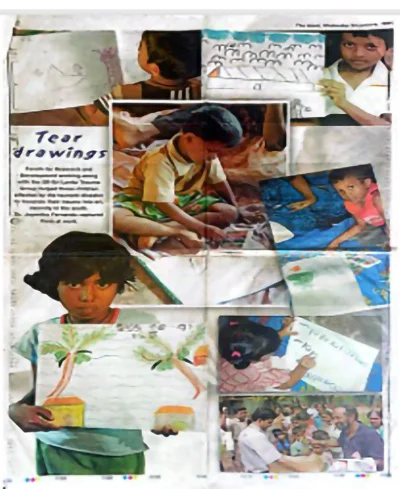
The Island picture page
The IRD distributed drawing material and play material to children in makeshift shelters. Some children grabbed drawing material, but some took away play material. Those who choose drawing material, drew in different camps, remarkably similar pictures; “how the tidal wave came”.
“The Island” supported the campaign generously, realising the potential impact of it.
The campaign became a popular and effective public health intervention.
“A public health intervention (PHI) is any action, policy, or programme designed to improve health outcomes at the population level. These interventions focus on preventing disease, promoting health, and protecting communities from health threats. Unlike individual healthcare interventions (treating individuals), which target personal health issues, public health interventions address collective health challenges and aim to create healthier environments for all.”
The campaign attracted highest attention of state and politicians.
The IRD continued this intervention throughout the protracted war, and during COVID-19.
The IRD quick to relaunch the “children first” campaign which once again have received proper attention by the public.
While promoting a public health approach to handling the situation, we would also like to note that there will be a significant smaller percentage of children and adolescents will develop mental health disorders or a psychiatric diagnosis.
We would like to share the scientific evidence for that, revealed through; the islandwide school survey carried out by the IRD in 2007.
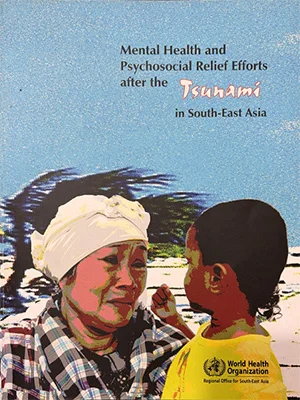 During the survey, it was found that the prevalence of emotional disorder was 2.7%, conduct disorder 5.8%, hyperactivity disorder was 0.6%, and 8.5% were identified as having other psychiatric disorders. Absenteeism was present in 26.8%. Overall, previous exposure to was significantly associated with absenteeism whereas exposure to conflict was not, although some specific conflict-related exposures were significant risk factors. Mental disorder was strongly associated with absenteeism but did not account for its association with tsunami or conflict exposure.
During the survey, it was found that the prevalence of emotional disorder was 2.7%, conduct disorder 5.8%, hyperactivity disorder was 0.6%, and 8.5% were identified as having other psychiatric disorders. Absenteeism was present in 26.8%. Overall, previous exposure to was significantly associated with absenteeism whereas exposure to conflict was not, although some specific conflict-related exposures were significant risk factors. Mental disorder was strongly associated with absenteeism but did not account for its association with tsunami or conflict exposure.
The authors concluded that exposure to traumatic events may have a detrimental effect on subsequent school attendance. This may give rise to perpetuating socioeconomic inequality and needs further research to inform policy and intervention.
Even though, this small but significant percentage of children with psychiatric disorders will need specialist interventions, psychological treatment more than medication. Some of these children may complain of abdominal pain and headaches or other physical symptoms for which doctors will not be able to find a diagnosable medical cause. They are called “medically unexplained symptoms” or “somatization” or “bodily distress disorder”.
Sri Lanka has only a handful of specialists in child and adolescent psychiatric disorders but have adult psychiatrists who have enough experience in supervising care for such needy children. Compared to tsunami, the numbers have gone higher from around 20 to over 100 psychiatrists.
Most importantly, children absent from schools will need more close attention by the education authorities.
In conclusion, going by the principles of research dissemination sciences, it is extremely important that the public, including teachers and others providing social care, should be aware that the impact of Cyclone Ditwah, which was followed by major floods and landslides, which is a complex emergency impact, will range from normal human emotional behavioural responses to psychiatric illnesses. We should be careful not to medicalise this normal distress.
It’s crucial to recall an important statement made by the World Health Organisation following the Tsunam
Prof. Sumapthipala MBBS, DFM, MD Family Medicine, FSLCFP (SL), FRCPsych, CCST (UK), PhD (Lon)]
Director, Institute for Research and Development in Health and Social Care, Sri Lanka
Emeritus Professor of Psychiatry, School of Medicine, Faculty of Medicine & Health Sciences, Keele University, UK
Emeritus Professor of Global Mental Health, Kings College London
Secretary General, International society for Twin Studies
Visiting Professor in Psychiatry and Biomedical Research at the Faculty of Medicine, Kotelawala Defence University, Sri Lanka
Associate Editor, British Journal Psychiatry
Co-editor Ceylon Medical Journal.
Prof. Athula Sumathipala
-

 News7 days ago
News7 days agoMembers of Lankan Community in Washington D.C. donates to ‘Rebuilding Sri Lanka’ Flood Relief Fund
-

 News5 days ago
News5 days agoBritish MP calls on Foreign Secretary to expand sanction package against ‘Sri Lankan war criminals’
-

 Features7 days ago
Features7 days agoGeneral education reforms: What about language and ethnicity?
-
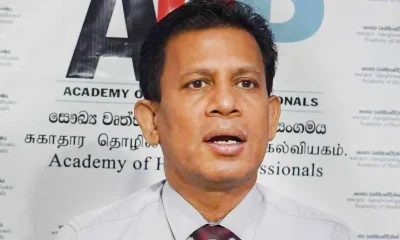
 News7 days ago
News7 days agoSuspension of Indian drug part of cover-up by NMRA: Academy of Health Professionals
-

 Sports5 days ago
Sports5 days agoChief selector’s remarks disappointing says Mickey Arthur
-

 News4 days ago
News4 days agoStreet vendors banned from Kandy City
-

 Editorial7 days ago
Editorial7 days agoA very sad day for the rule of law
-

 News7 days ago
News7 days agoUS Ambassador to Sri Lanka among 29 career diplomats recalled

